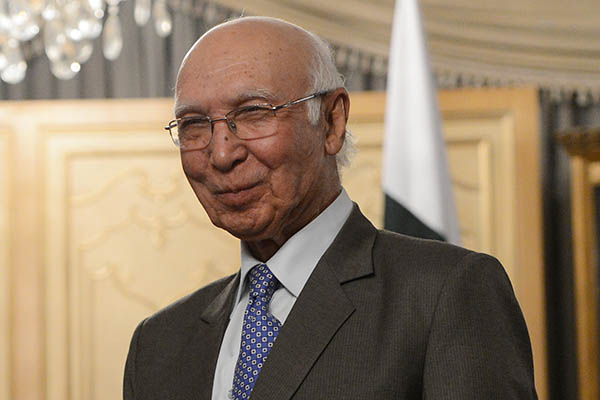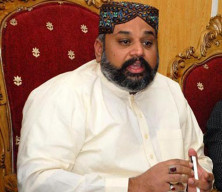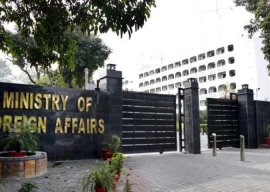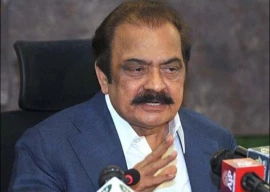
The government’s top adviser on foreign policy and security has reiterated Pakistan’s peace overtures and advocated better relations with neighbours to address national security challenges.
“An attempt to tackle domestic security challenges should be the main objectives for foreign policy and national security respectively,” Sartaj Aziz, the Adviser to the Prime Minister on National Security and Foreign Policy said on Thursday.
He was giving the keynote speech at a seminar on “Rethinking National Security of Pakistan: Challenges and Opportunities” at the Institute of Strategic Studies Islamabad (ISSI) on the occasion of the institute’s 40th anniversary.

Aziz, who enjoys the status of federal minister, said better relations with India and Afghanistan should be the first objective in spelling out Pakistan’s foreign policy and linking it with the country’s national security.
“If we have a peaceful neighbourhood, a very substantial part of our security dilemma gets sorted out,” he emphasized. “Sorting out our relations with India is a top priority.”
He said Pakistan’s “peace offensive” with India had continued despite the hiatus caused by the elections and also linked economic stability with regional peace.

“We cannot achieve our economic objectives without peace in South Asia,” Aziz said.
After regional peace, he said, Pakistan needs to reset its relationship with the US after 2014 in a new “lasting” framework, one that goes beyond Afghanistan and in which the world superpower does not view Pakistan through the Afghan lens.
The adviser termed the uncertain situation in Afghanistan ahead of the US-led International Security Assistance Force (ISAF) troops’ withdrawal, the continuous problems with India, restoring Pakistan’s image abroad and reconciling global alliances with policy as some of the challenges.

But he also highlighted the potential economic opportunities Pakistan has because its geographic location serves as a land bridge between south, east and west Asia.
Regarding national security, he said internal security challenges need to be tackled first.
“If we can address our domestic security challenges, it will be long before we overcome our external challenges,” the PM’s adviser said. “We need to put our house in order.”
Aziz, who was foreign minister during Nawaz Sharif’s second tenure in 1997-98 said the mechanisms to deal with the complex national security issue in a broad sense have unfortunately never been developed in the country.
But he mentioned that the government has formed a cabinet committee on national security. The committee’s efforts, he said, will eventually lead to an integration of foreign policy, national security policy and defence policy.
Earlier, Maria Sultan, Director-General of the South Asian Strategic Stability Institute, and Zafar Nawaz Jaspal, director of Quaid-i-Azam University’s School of Politics and International Relations, gave academic talks on national security and military strategy respectively.
Sultan said 21st Century changes have made “institutional strength” the “centre of gravity” for national security. She said states need to protect their institutional credibility by moving across four domains: social, physical, cognitive and informational.
She said Pakistan, like any other state, needs to develop an effective communication strategy and ensure that the institutional strength does not get eliminated.
The ISSI director-general Dr Rasul Bakhsh Rais said the traditional paradigm of security studies is premised on external military threats and is not capable of fully explaining the national security problems in post-clonial states such as Pakistan. He said the traditional national security approach obscures Pakistan’s domestic security issues such as internal contestations of power, militancy, sectarianism and coercive enforcement of religion by private groups among others.
“Security studies cannot be confined to military and external threats alone,” Rais said. “Internal security should be made a part of the discussion.”
Published in The Express Tribune, December 27th, 2013.
COMMENTS (5)
Comments are moderated and generally will be posted if they are on-topic and not abusive.
For more information, please see our Comments FAQ

















Its simple, pakistan needs a benevolent dictataor to hammer the country into shape, he needs to rule with a iron fist, yet having the utmost respect for justice. There needs to be a zero tolerance policy for all acts of violence. people need to understand that pakistan is pakistan, democracy doesnt work and never has worked for the country. there needs to be a shift to sharia law. we need to drop these western ideals because we are not western, we are muslims we need to have some self respect.
Simple put : Stop hating India. But, what about the Two Nation Theory? What about Kashmir?
In a way, by India being India, by just moving forward, not caring, not talking, is inflicting grave hardships over Pakistan.
Let us get one thing straight. If Pak's objective of better ties with neighbours is only for the purpose of peace and domestic security, no one will listen. This is because Pakistan, once it achieves domestic peace, may revert back to old games of poking its nose in the neighbourhood on the age old pretext of "delhi chalo", alleged water theft, kashmir etc. Good neighbourly relations are required because that is what is decency and civility. Internal peace will come once you eliminate terrorism. If any neighbour is playing games inside Pakistan, shall I remind you that it is only a reaction to actions committed by Pakistan and nothing else. Once your actions cease, the reactions also will. Attending to reactions will not get you peace.